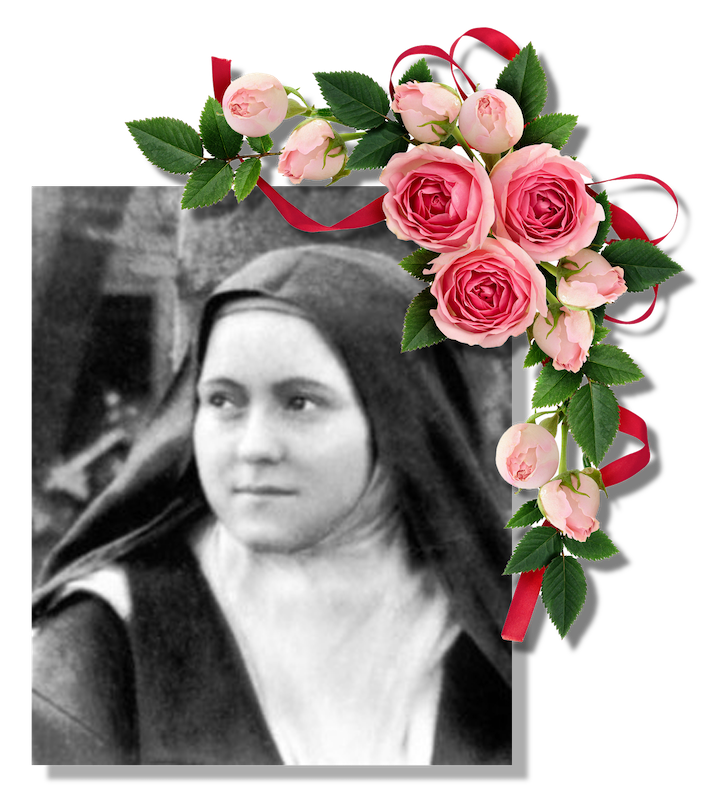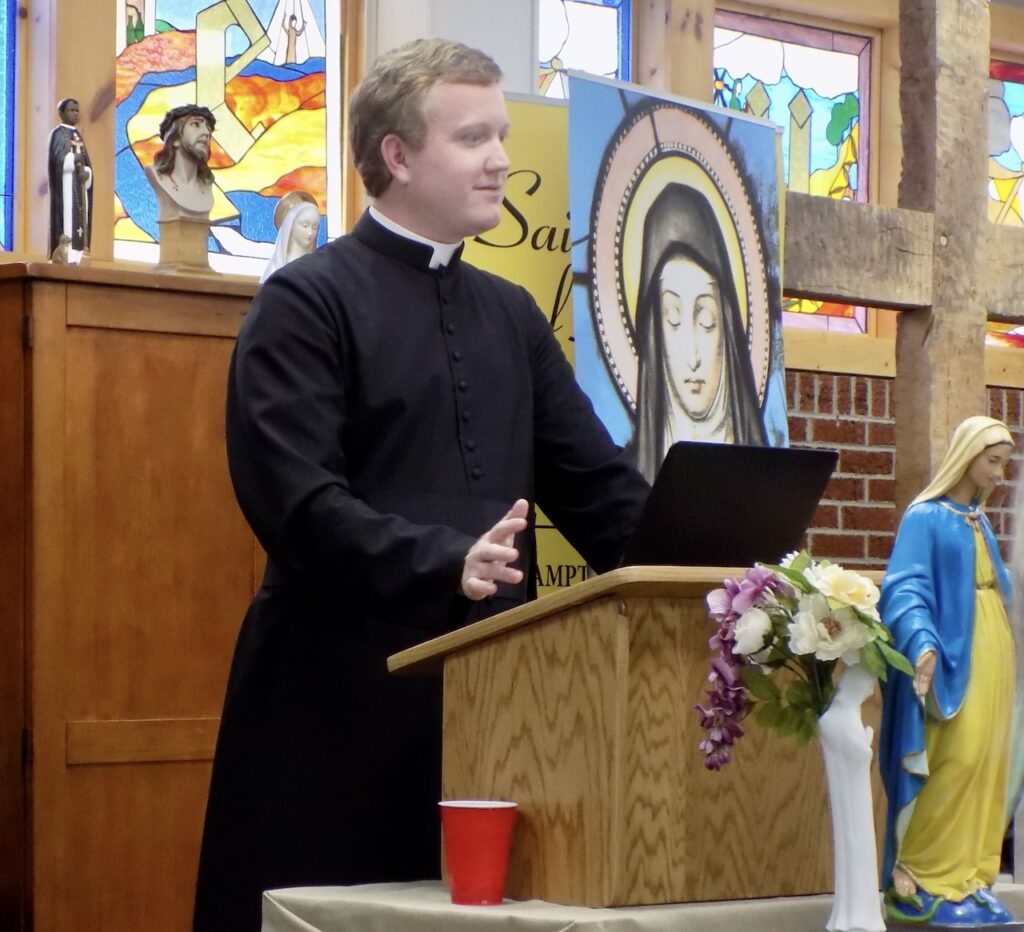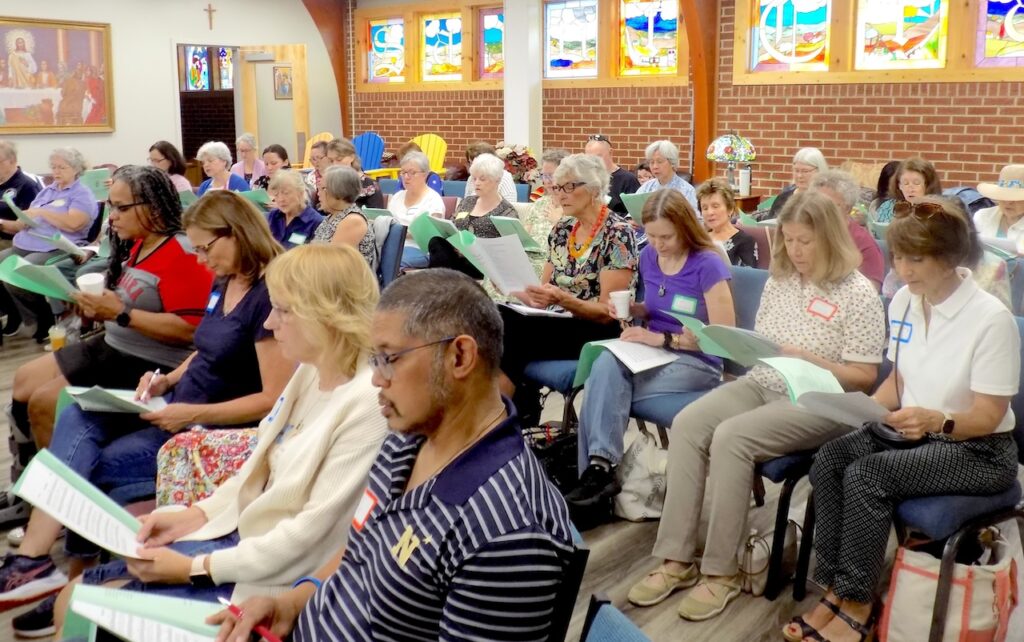St. Thérèse of Lisieux did not write volumes, as did St. Augustine or St. Thomas Aquinas, said Father Dillon Bruce, parochial vicar of the Peninsula Cluster of St. Joseph, Hampton; St. Mary Star of the Sea, Fort Monroe; and St. Vincent de Paul, Newport News.
“In fact, her theology can be summarized in one word,” he said. “Love.”
Sixty-five people gathered at the St. Clare of Assisi Retreat Center, Hampton, on Saturday, Aug. 17, for a day of recollection entitled, “Story of a Soul: Transformation in Christ,” inspired by the writings of St. Thérèse of Lisieux, who taught, above all, to do small things with great love.
The Community of St. Joseph Secular Order of Discalced Carmelites, a lay order composed of people of all walks of life – men and women, married and single – hosted the event.
“It’s our apostolate to share the Carmelite spirituality,” said Angela Vel, formation director of the community. “It’s the first retreat our chapter has held since 2019.”
“It’s exciting,” she added. “We didn’t expect so many people.”
Theology in one word
Born in 1873 in northern France, St. Thérèse “received a formation both demanding and full of tenderness,” Father Bruce said.
Her mother died when she was four years old; this left a mark on her, a wound. She was overly sensitive and emotionally fragile. She felt enclosed, she wrote, within a narrow circle of herself.

After Christmas Eve Mass in 1886, she experienced an epiphany, Father Bruce explained. As she was the youngest, her family tended to indulge her, still hiding presents in her shoes on Christmas Eve. That year, she overheard her father, who was growing weary of this, say, “Thank goodness this is the last time.”
St. Thérèse was tempted to cry. Instead, she felt filled with a new grace. She ran down into the dining room and unwrapped her presents “joyfully,” determined not to spoil the night.
She had gotten back the “strength of mind” she had lost at four, she later wrote. She felt herself transformed.
At fifteen, she traveled to Rome, where she petitioned Pope Leo XIII to allow her to enter the Order of Discalced Carmelites early. In the convent of the cloistered community in Lisieux, she began to write.
Her theology can fit on a postage stamp, but it speaks volumes, Father Bruce said.
“For St. Thérèse, the defining attribute of God – what makes God, God – is love,” he said. “Since God is perfect mercy, we should stand confident before it. Confident, and dependent, on his mercy and will.”
St. Thérèse was canonized in 1925 and made a Doctor of the Church in 1997 – named such, Father Bruce said, because “she sheds a new light on the Gospel.”
“She helps us to rediscover the transformative power of God’s love,” he said.
A time of reflection
In the gardens of the retreat center, Le Murphy smiled after discovering a bird’s nest tucked away on a statue of St. Michael, just above his wing: a little miracle of design amidst the glory of the archangel, perfectly suited to a day devoted to looking for everyday grace.
Murphy said that she and her husband, James, parishioners of St. Gregory the Great, Virginia Beach, were drawn to attend the retreat in preparation for a pilgrimage to France they are making next year, with a stop in Lisieux.
“I’ve always been intrigued by her spirituality,” James Murphy said, “but I never fully understood or absorbed it. I was interested in learning more.”
After an introduction to the saint, the retreatants were invited to go into the chapel or to settle in the gardens to reflect on a series of guided questions: “What obstacles stand in the way of my transformation?” “Who needs my forgiveness?” “Where in my past have I experienced moments of grace?”
Time spent in reflection can “be an exciting thing,” Father Bruce said, “but it can also be painful. We do not go through this silence alone. The Lord is with us. He’s not interested in the person who you hope to become, or the person who you thought you are, but in who you are, right now.”
Carolyn Moore, a parishioner of St. Joseph, said she found the silent time valuable.
“That’s one of the things that drowns out God’s word – the busyness,” she said.
“I was trying to take some time to listen,” said Mary Beth Bochel, a parishioner of St. Jerome, Newport News. “To be a ‘Mary,’ rather than a ‘Martha,’ which is what I tend to be.”
Mary Cordaro, a parishioner of St. Joan of Arc, Yorktown, said she recalled a simple moment of grace: the gift of a journal, given to her 20 years ago by a coworker for her birthday.
She was not one to keep a journal, Cordaro said, but, “Every night, I tried to take time to write down something positive, something I was grateful for. It ended up being a prayer journal. It changed me from being a very negative person into being a positive person.”
“She doesn’t know how much she changed my life,” she said.
“If you take the time to listen, God will reveal himself to you,” said Arlene Bradley, parishioner of St. Joan of Arc. “Not only are you made aware of what stands in your path, but it leads you to ask: ‘What are you going to do about it?’”
“No matter how much grace we are showered with, we have to choose. Every day is a decision,” she said.
‘Action follows being’
“One of my favorite things about St. Thérèse is her ability to share her desires with the Lord. She told God everything. She did not know how to handle the promptings of her heart. She wanted more,” Father Bruce said.

Restless, she turned to Scripture. In 1 Corinthians she read of all the gifts she dreamed of, but found, too, that all such gifts are useless without love.
“Action follows being. Charity is not a matter of fine sentiments. It’s a matter of doing things,” Father Bruce said.
Transformed by God’s love for her, she, in turn, began to practice love in quiet, unseen ways. St. Thérèse decided to treat one nun whom she found trying just as if she loved her “dearer than anyone in the world,” Father Bruce said.
“She chose to love. So much so that her own sisters thought the nun was one of her best friends,” he said, laughing.
After St. Thérèse’s death from tuberculosis at the age of 24, her writings were published. Word of her “little way of trust and love” spread, resonating with so many that, today, she is the patron saint of missions, even though – other than her pilgrimage to Rome – she never left her corner of France.
Maryann Ayer, past president of the St. Joseph Community of Discalced Carmelites, said she found the day refreshing and inspiring.
“The biggest takeaway, for me, is that the saints were mere mortals. They were human,” she said. “They prove that we can do it, too.”
“We are all called to holiness,” she said. “Each and every one of us.”

